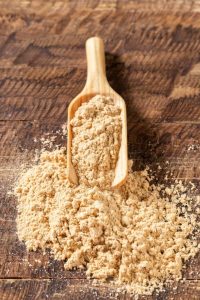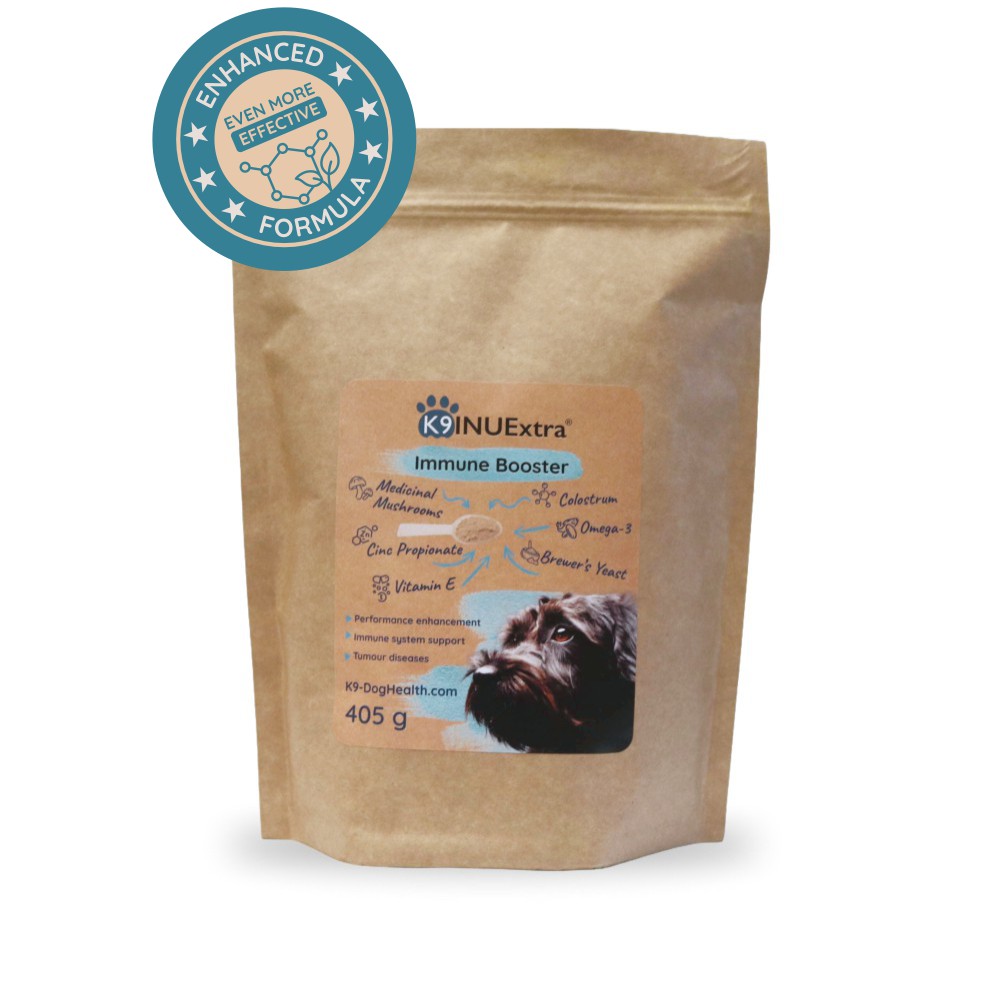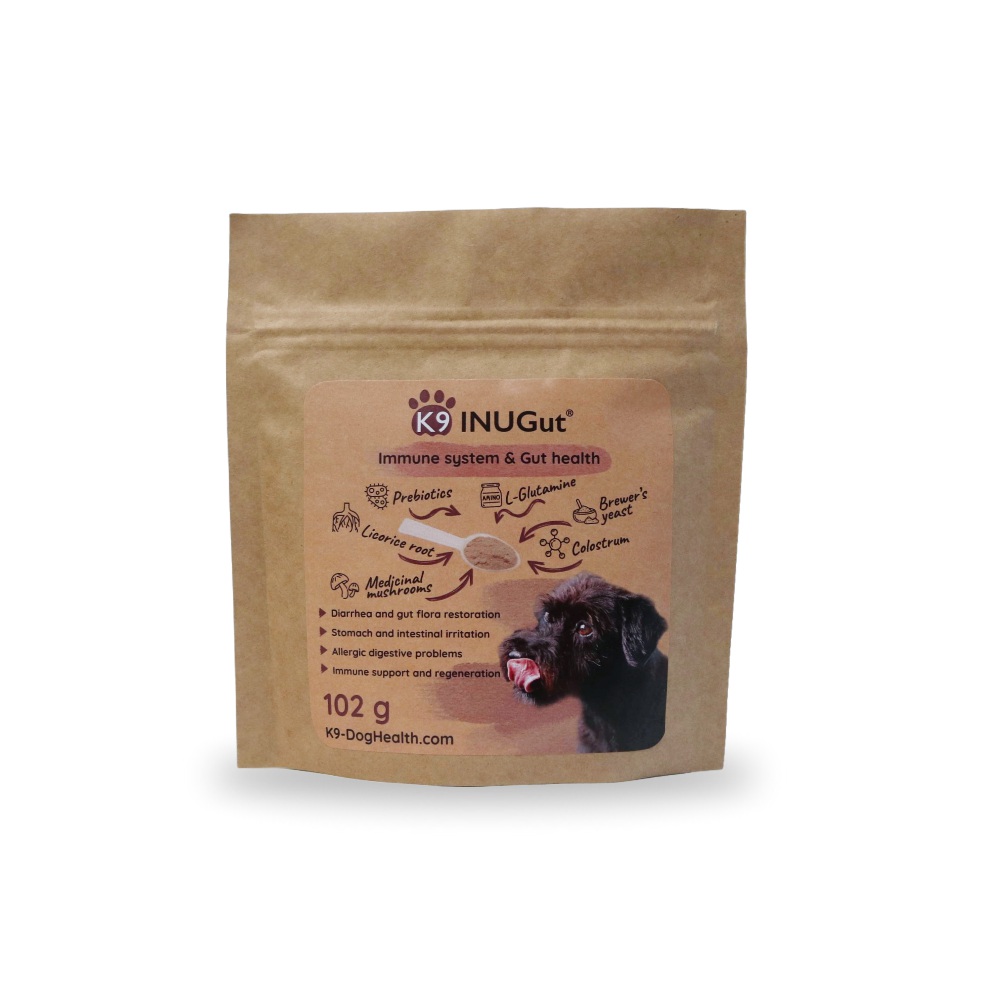Brewer’s yeast – Natural immune booster and digestive support
Many dog owners look for natural and safe solutions that can genuinely support their dog’s health, help the immune system function properly, or provide digestive support. Brewer’s yeast has been a known and widely used ingredient in canine nutrition for decades, but in recent years its value has increased significantly, as several studies have confirmed that the beta-glucans, B vitamins, amino acids, and prebiotic fibers it contains can support a dog’s body in multiple ways.
Modern veterinary nutrition no longer treats brewer’s yeast simply as a vitamin source, but as a functional compound that influences the balance of gut microbiota, immune system activity, and skin and coat condition. Since it is easy to dose, natural, and well tolerated, many dog owners notice positive changes within just a few weeks.
Below, we explain why brewer’s yeast is so valuable, which scientific findings support its benefits, and what to look for if you want to choose a high-quality product for your dog.
What is brewer’s yeast?

High-quality brewer’s yeast is rich in protein, natural amino acids, B vitamins, and bioactive compounds such as beta-glucans and MOS (mannan-oligosaccharides).
Types of brewer’s yeast
Not all brewer’s yeast is the same. Different manufacturing and purification methods result in different nutrient and active compound profiles. The most common forms include:
- Whole dried brewer’s yeast – nutrient-dense, general use.
- Yeast cell wall – concentrated beta-glucan and MOS content.
- Feed-grade yeast – lower quality, often not standardized.
- Human-grade yeast – cleaner and richer in nutrients, though not always optimized for animals.
Because of these differences, it is important to check the active compound profile and manufacturer documentation when choosing brewer’s yeast for dogs.
Main benefits of brewer’s yeast in dogs
1. Natural immune support through beta-glucans
One of the most valuable components of brewer’s yeast is beta-1,3/1,6-glucan, which supports the normal function of the immune system. It activates macrophages, neutrophils, and natural killer cells, helping the body respond quickly during infections or inflammatory processes. Research shows it may be particularly beneficial for elderly dogs, stressed animals, or those with cancer.
2. Healthy gut microbiota and stable digestion
The MOS in brewer’s yeast acts as a prebiotic, supporting the growth of beneficial gut bacteria. It can also reduce the adhesion of certain harmful bacteria, helping maintain balanced gut flora and healthy digestion. This is especially helpful after antibiotic treatment or in dogs with recurring digestive problems.
Clinical studies have shown that yeast-derived prebiotics can enhance nutrient absorption and improve digestive efficiency.
3. Improved skin and coat quality
Brewer’s yeast contains a natural B vitamin complex that is essential for skin cell regeneration and for maintaining healthy hair follicles. Furthermore, biotin, niacin, and riboflavin all work together to improve coat shine and elasticity, and they also help reduce excessive shedding.
4. Natural appetite enhancer
Due to its distinctive aroma, brewer’s yeast is appealing and tasty for many dogs. It can be a useful aid for picky eaters, dogs recovering from illness, or elderly dogs with reduced appetite.
5. High protein and amino acid content
Brewer’s yeast typically contains 25-30% protein, which is exceptionally high. As a plant-derived protein, it is hypoallergenic and easy to utilize, making it ideal for sensitive or allergy-prone dogs.
Which dogs benefit the most?
Brewer’s yeast can benefit many dogs, but it is particularly valuable in certain life stages or conditions where the body has increased nutrient needs, immune stress, or altered gut balance.
- Senior dogs – for immune support and maintaining vitality.
- Dogs recovering from illness – supports regeneration and nutrient absorption.
- Dogs with cancer – beta-glucans provide immune modulation.
- Dogs with skin or coat issues – B vitamins and biotin support skin health.
- Picky eaters – natural aroma helps improve appetite.
- Digestive sensitivity – MOS supports gut flora balance.
- During and after antibiotics – aids gut microbiome recovery.
- Sport and working dogs – offers additional protein and micronutrient support.
What to look for when choosing brewer’s yeast
-


K9 INUExtra®
- Premium immune support with medicinal mushrooms and colostrum
- Anti-inflammatory support with curcumin, omega-3 and BioPerine
- Stronger gut flora and improved digestion with brewer’s yeast and targeted prebiotics
- Antioxidant cellular protection with vitamin E, zinc and natural active compounds
€64,93 (ex.VAT)
These are the main factors that help you quickly assess the quality of brewer’s yeast, and together they provide a clear picture of what makes a product truly reliable. High active compound levels, low moisture, and proper microbiological purity all indicate a safe and well-utilized ingredient for your dog.
Which brewer’s yeast should you avoid?
There are many yeast-based products on the market, but not all are suitable for dogs. Some low-quality versions may have poor nutrient profiles or may even be contaminated. Avoid products with the following characteristics:
- Unknown or unverifiable origin – lack of a certificate of analysis is a major quality concern.
- Low protein or beta-glucan content – indicates weak nutritional value.
- High moisture levels – shorter shelf life, higher microbiological risk.
- Strong, unpleasant odor or visible impurities – signs of poor storage or low quality.
- Feed-grade yeast used as filler – often diluted and with inferior active compound profiles.
Brewer’s yeast and allergies – myths and facts
Dog owners sometimes wonder whether brewer’s yeast can cause allergies or contribute to fungal infections. It is important to clarify that brewer’s yeast given to dogs is inactivated, meaning it is not a live organism, cannot proliferate in the body, and does not cause fungal infections.
Yeast allergy is very rare, though possible. If a dog is sensitive, brewer’s yeast should be introduced gradually while watching for skin or digestive reactions. Brewer’s yeast has no connection to Candida or Malassezia infections – these are completely different types of fungi.
Contrary to common myths, brewer’s yeast does not worsen fungal issues, does not cause fermentation, and does not trigger Candida. It is safe when used in appropriate quality and introduced gradually.
Key parameters of the brewer’s yeast we use in our products
- Protein content: 29% – higher than the usual 25%, indicating a more concentrated ingredient.
- Beta-glucan content: 23.8% – exceptionally high, offering one of the strongest immune-modulating profiles.
- Moisture level: 5% – low moisture ensures greater stability and shelf life.
- Microbiological purity: E. coli and Salmonella negative – safe even for sensitive or recovering dogs.
Can you overdose brewer’s yeast?
Brewer’s yeast is safe and well tolerated, and overdoses are rare. Since the B vitamins it contains are water-soluble, any excess is not stored but excreted from the body. Extremely large amounts may cause bloating or gas.
It is best to introduce brewer’s yeast gradually, especially in dogs with sensitive digestion. If any unusual symptoms occur, temporarily reduce the dose or consult a veterinarian.
Common myths about brewer’s yeast
- Brewer’s yeast is a live fungus – not true. The form given to dogs is inactivated.
- It worsens fungal infections – no connection at all. Other fungi cause such infections.
- It causes weight gain – no, it contains minimal calories.
- It cannot be given to dogs with allergies – yeast allergy is rare; most dogs tolerate it well.
- It causes fermentation in the gut – impossible, as it is not a live yeast.

How to dose brewer’s yeast for dogs
Nutritional yeast is usually given in powder or tablet form. The general dosage is 0.5 – 1 g / 10 kg body weight. It should be introduced slowly and gradually, especially in dogs with sensitive digestion. Regular use supports immune function, gut flora, and healthy skin and coat.
Brewer’s yeast and other supplements – when to be cautious?
The yeast can generally be combined safely with other natural supplements, but in some cases caution is needed. It is important not to overload the dog’s digestive system or immune system with excessive amounts of certain active ingredients.
- High-dose probiotics – since nutritional yeast acts as a prebiotic, too many probiotics may cause gas or bloating in sensitive dogs.
- B vitamin supplements – brewer’s yeast is naturally rich in B vitamins, so excess intake may cause temporary diarrhea or restlessness.
- Other immune-active supplements – while strong immune stimulants used together may theoretically trigger excessive immune reactions, it is important to differentiate: purified, standardized brewer’s yeast beta-glucan, premium mushroom extracts, and colostrum do not cause overstimulation but provide balanced immune modulation. When used in proper ratios, they can work synergistically, supporting natural immune defenses without overloading the system.
- High-fiber supplements – MOS is a prebiotic fiber, so combining multiple fiber sources may cause temporary loose stools.
- Yeast sensitivity – rare, but if a dog has previously reacted to yeast-based foods, slow introduction is recommended.
Brewer’s yeast is well tolerated in most dogs, but every dog is unique. When combining multiple supplements, always observe your dog’s reactions and consult a vet if necessary.
Frequently asked questions about brewer’s yeast
❓ Is brewer’s yeast safe for all dogs?
Yes, it is generally safe. Introduce it gradually to avoid digestive discomfort.
❓ Does it reduce shedding?
Thanks to its B vitamins and biotin content, many dogs experience noticeably reduced shedding and shinier coats.
❓ Can it be given to dogs with cancer?
Yes. Due to the beta-glucans, it can be particularly beneficial, but always consult your veterinarian.
❓ When will I see results?
Digestive improvements are often noticeable within 5-7 days, while coat and skin results typically appear after 4-8 weeks.
More natural health solutions for your dog
If you’re looking for more natural ways to support your dog’s immune system, read how lion’s mane for dogs can help maintain brain and digestive health. Many dog owners also use Boswellia serrata for its anti-inflammatory benefits, especially for joint issues or chronic inflammation.
If you are using brewer’s yeast mainly for digestive or gut flora support, our guide on restoring your dog’s gut flora may also be helpful. In cases of food sensitivity or recurring itching, it is worth reading about the link between gut balance and dog allergies.
Supporting the immune system of older dogs can be complex, so our guide on immune support for senior dogs provides detailed natural strategies that pair well with brewer’s yeast. Many owners also find our article on omega-3 for dogs useful, especially for skin problems or joint pain.
Among natural gut-supportive solutions, the yeast can also be combined with homemade options. We have a full guide explaining how to make homemade probiotics for dogs and how to introduce them for long-term benefits.
Important:
This article on brewer’s yeast is for informational purposes only and should not replace veterinary examinations or treatment. Always consult your veterinarian for diagnosis and appropriate therapy.
References:
- Zhong, X., Wang, G., Li, F., Fang, S., Zhou, S., Ishiwata, A., Tonevitsky, A. G., Shkurnikov, M., Cai, H., & Ding, F. (2023). Immunomodulatory effect and biological significance of β-glucans. Pharmaceutics, 15(6), 1615.
- Middelbos, I. S., Godoy, M. R., Fastinger, N. D., & Fahey, G. C. (2007). A dose-response evaluation of spray-dried yeast cell wall supplementation of diets fed to adult dogs: Effects on nutrient digestibility, immune indices, and fecal microbial populations. Journal of Animal Science, 85(11), 3022-3032.
- Pawar, M. M., Pattanaik, A. K., Sinha, D. K., Goswami, T. K., & Sharma, K. (2017). Effect of dietary mannanoligosaccharide supplementation on nutrient digestibility, hindgut fermentation, immune response and antioxidant indices in dogs. Journal of Animal Science and Technology, 59, 11.
- Lin, C. Y., Carroll, R., Miller, M., Keagy, N., Shoveller, A. K., & Gross, K. L. (2020). Supplementation of yeast cell wall fraction tends to improve intestinal health in adult dogs undergoing an abrupt diet transition. Frontiers in Veterinary Science, 7, 597939.
- Kroll, F. S. A., Putarov, T. C., Zaine, L., Venturini, K. S., Aoki, C. G., Santos, J. P. F., Pedrinelli, V., Vendramini, T. H. A., Brunetto, M. A., & Carciofi, A. C. (2020). Active fractions of mannoproteins derived from yeast cell wall stimulate innate and acquired immunity of adult and elderly dogs. Animal Feed Science and Technology, 261, 114392.
- Theodoro, S. de S., Putarov, T. C., Tiemi, C., Volpe, L. M., de Oliveira, C. A. F., Glória, M. B. A., Carciofi, A. C., & Brunetto, M. A. (2019). Effects of the solubility of yeast cell wall preparations on their potential prebiotic properties in dogs. PLOS ONE, 14(11), e0225659.



